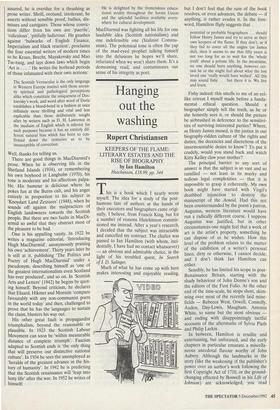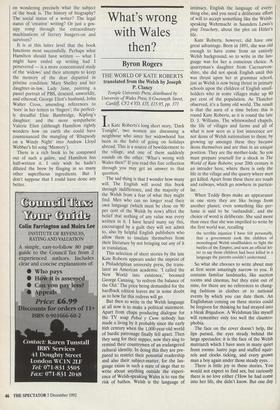Hanging out the washing
Rupert Christiansen
KEEPERS OF THE FLAME: LITERARY ESTATES AND THE RISE OF BIOGRAPHY by Ian Hamilton Hutchinson, £18.99, pp. 344 This is a book which I nearly wrote myself. The idea for a study of the post- humous fate of authors at the hands of their executors and biographers came origi- nally, I believe, from Francis King, but for a number of reasons Hutchinson commis- sioned me instead. After a year's research, I decided that the subject was intractable and cancelled my contract. The chalice was passed to Ian Hamilton (with whom, inci- dentally, I have had no contact whatsoever) — an obvious and admirable choice, in the light of his troubled quest, In Search of J. D. Salinger.
Much of what he has come up with here makes interesting and enjoyable reading, but I don't feel that the sum of the book resolves, or even advances, the debate — if anything, it rather evades it. In the fore- word, Hamilton fliply suggests that
potential or probable biographees . . . should follow Henry James and try to serve as their own keepers of the flame. If they don't, or if they fail to cover all the angles (as James did), then it seems to me that fifty years is not too long for us to wait for the 'whole truth' about a private life. In the meantime, no one should burn anything, however cer- tain he or she might feel about what the lost loved one 'really would have wished'. All this may sound fishy . . . but there it is. We live and learn.
Fishy indeed: this smells to me of an eel- like retreat I myself made before a funda- mental ethical question. Should a biographer simply tell the truth, as he or she honestly sees it, or should the picture be airbrushed in deference to the sensitivi- ties of surviving interested parties? Where, as Henry James mused, is the justice in our biography-ridden culture of 'the rights and duties, the decencies and discretions of the insurmountable desire to know'? To put it crudely, would you stand back and watch Kitty Kelley claw your mother?
The principal barrier to any sort of answer is that the subject is so vast and so ramified — not least in its murky and tedious legal complexities — that it is impossible to grasp it coherently. My own book might have started with Virgil's deathbed injunction to destroy the manuscript of the Aeneid. Had this not been countermanded by the poem's patron, Augustus, western literature would have run a radically different course. I suppose Augustus was justified, but in other circumstances one might feel that a work of art is the artist's property, something he can dispose of as he wishes. How this level of the problem relates to the matter of the exhibition of a writer's personal linen, dirty or otherwise, I cannot decide; and I don't think Ian Hamilton can either.
Sensibly, he has limited his scope to post- Renaissance Britain, starting with the shady behaviour of John Donne's son and the editors of the First Folio. At the other end of the time-scale, he stops short, skim- ming over most of the recently laid mine- fields — Rebecca West, Orwell, Connolly, Auden, Day-Lewis, Maugham, Antonia White, to name but the most obvious — and ending with disappointingly tactful accounts of the aftermaths of Sylvia Plath and Philip Larkin.
In between, Hamilton is erudite and entertaining, but unfocused, and the early chapters in particular emanate a miscella- neous anecdotal flavour worthy of John Aubrey. Although the landmarks in the story (like the weakening of the publisher's power over an author's work following the first Copyright Act of 1710, or the ground- changing effected by Boswell in his Life of Johnson) are acknowledged, you read
on wondering precisely what the subject of the book is. The history of biography? The social status of a writer? The legal status of 'creative' writing? Or just a gos- sipy romp through the extraordinary machinations of literary hangers-on and survivors?
It is at this latter level that the book functions most successfully. Perhaps what Hamilton should have written — what I might have ended up writing had I persevered — is a more concentrated study of the 'widows' and their attempts to keep the memory of the dear departed in pristine condition: Mary Shelley and her daughter-in-law, Lady Jane, painting a pastel portrait of PBS, desexed, unworldly, and ethereal; George Eliot's husband, John Walter Cross, amending references to 'toes' in her letters to 'fingers'; the perfect- ly dreadful Elsie Bambridge, Kipling's daughter; and the more sympathetic Valerie Eliot (although Hamilton rightly wonders how on earth she could have countenanced the mangling of 'Rhapsody on a Windy Night' into Andrew Lloyd Webber's hit song 'Memory).
There is a rich book to be composed out of such a galere, and Hamilton has half-written it. I only wish he hadn't diluted the brew by flinging in so many other superfluous ingredients. But I don't suppose that I could have done any better.











































































 Previous page
Previous page